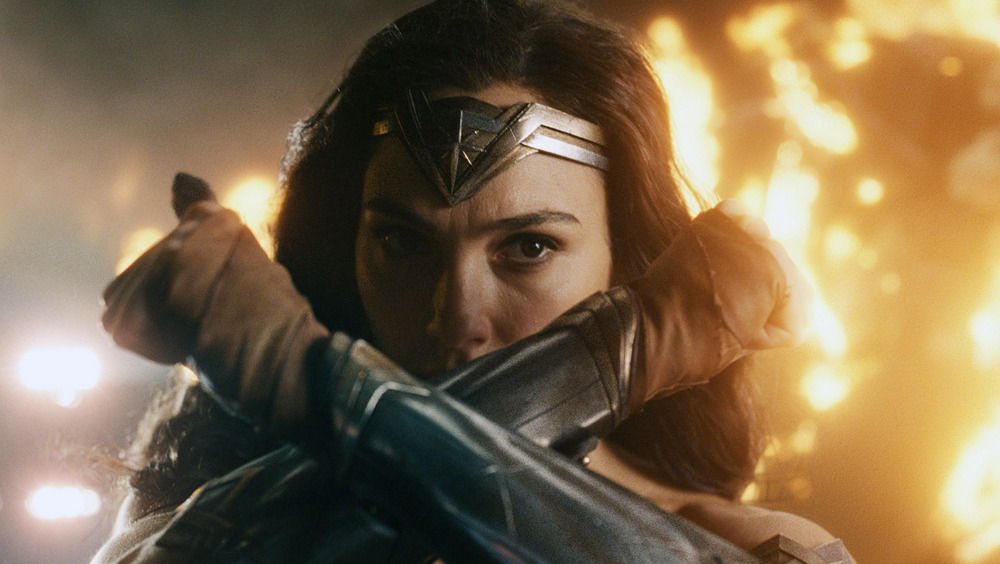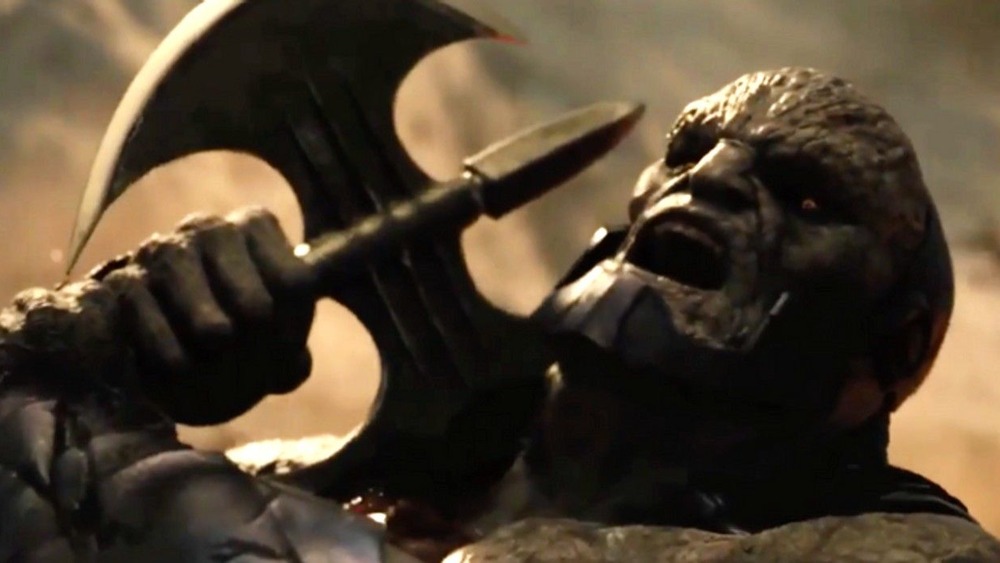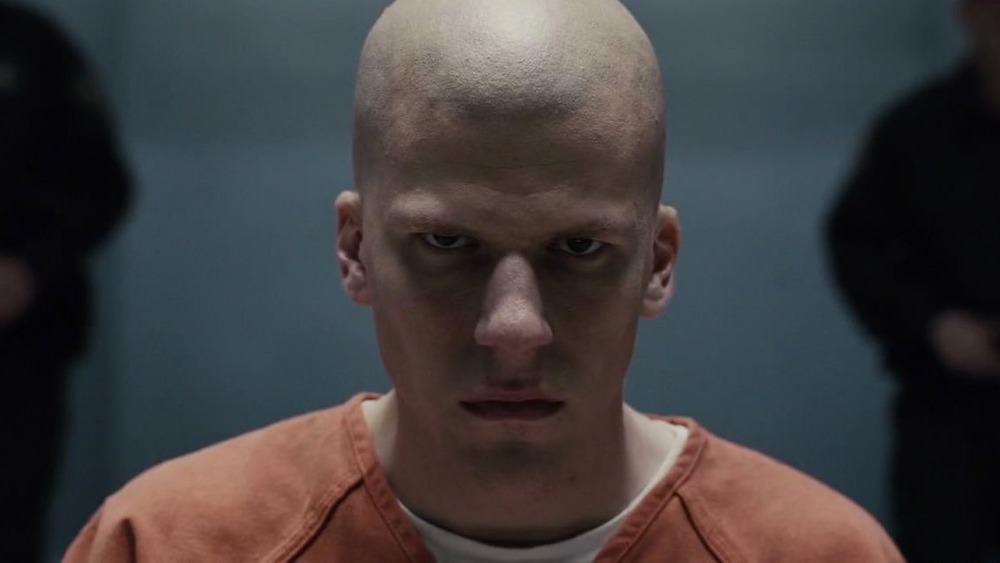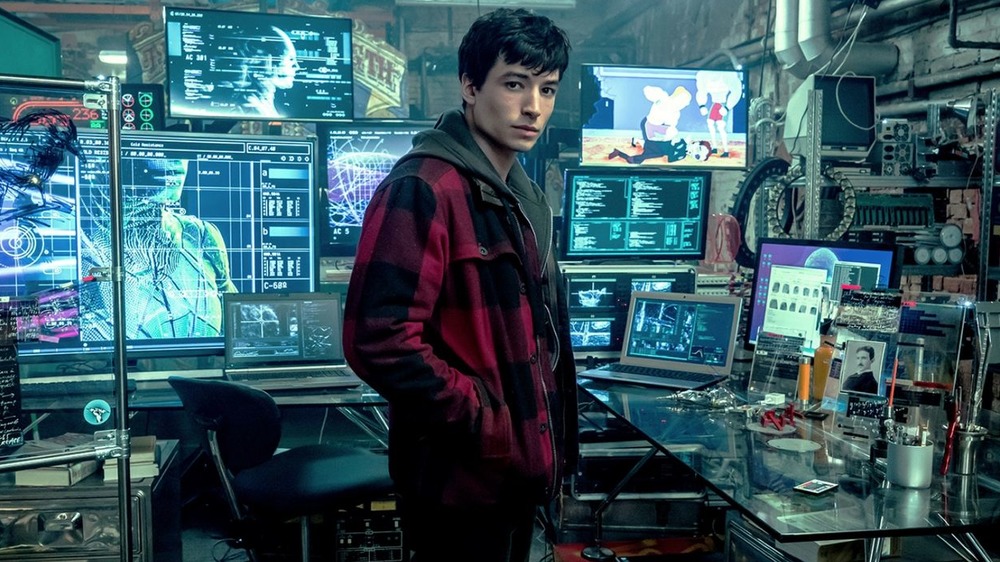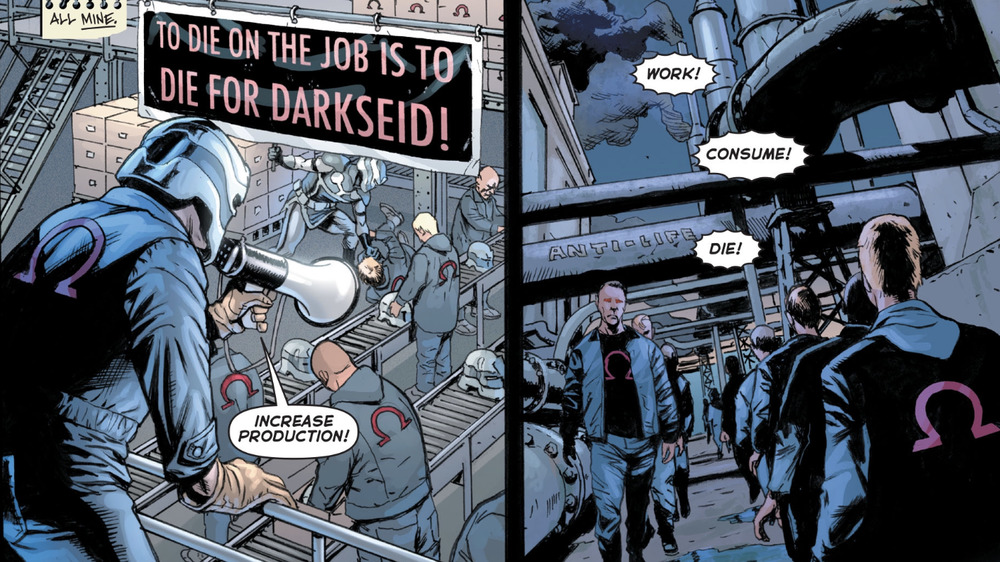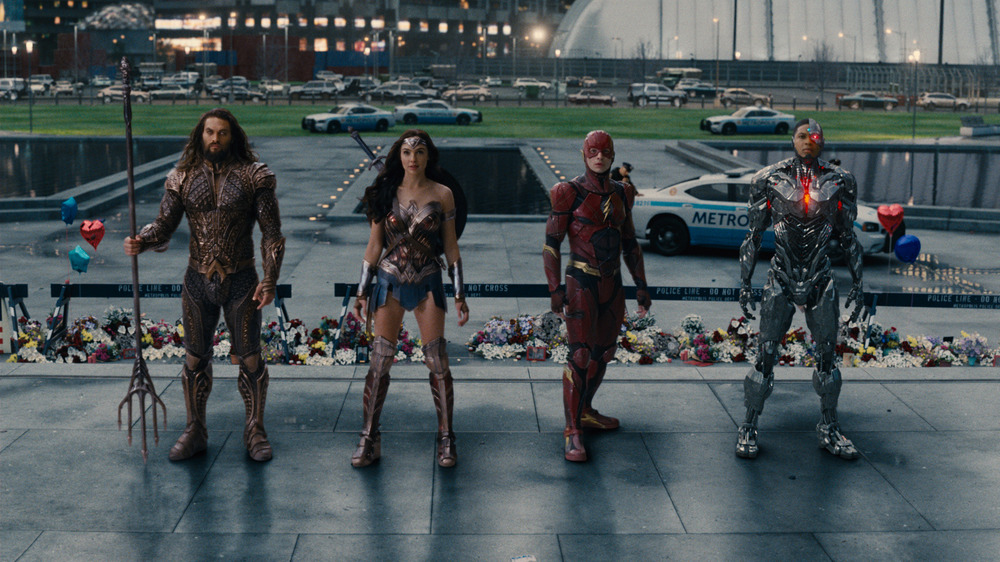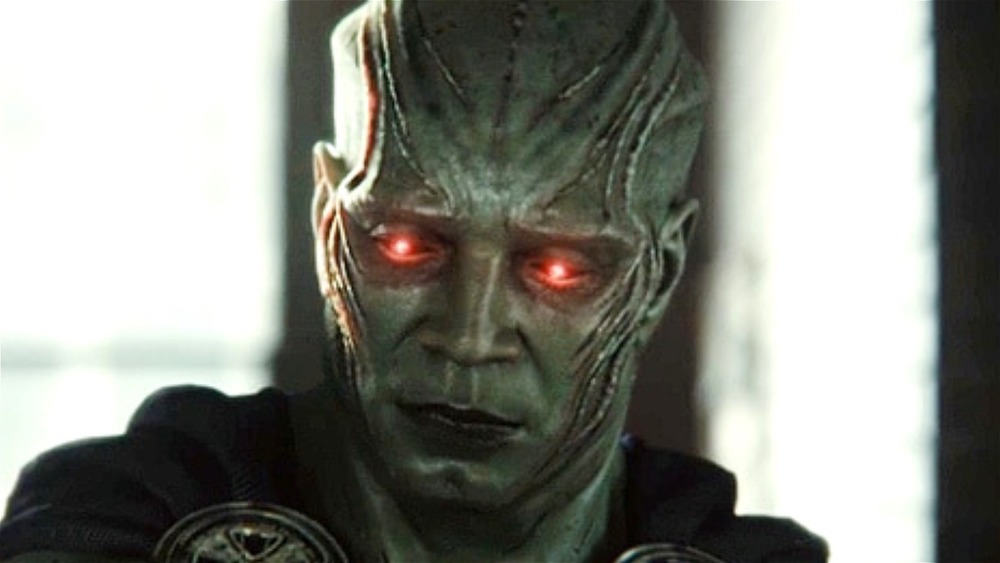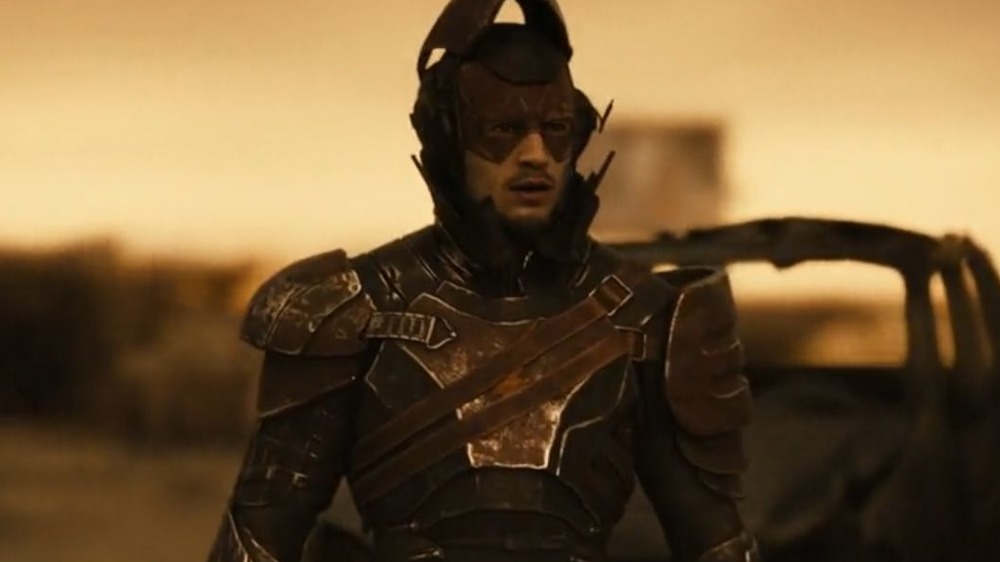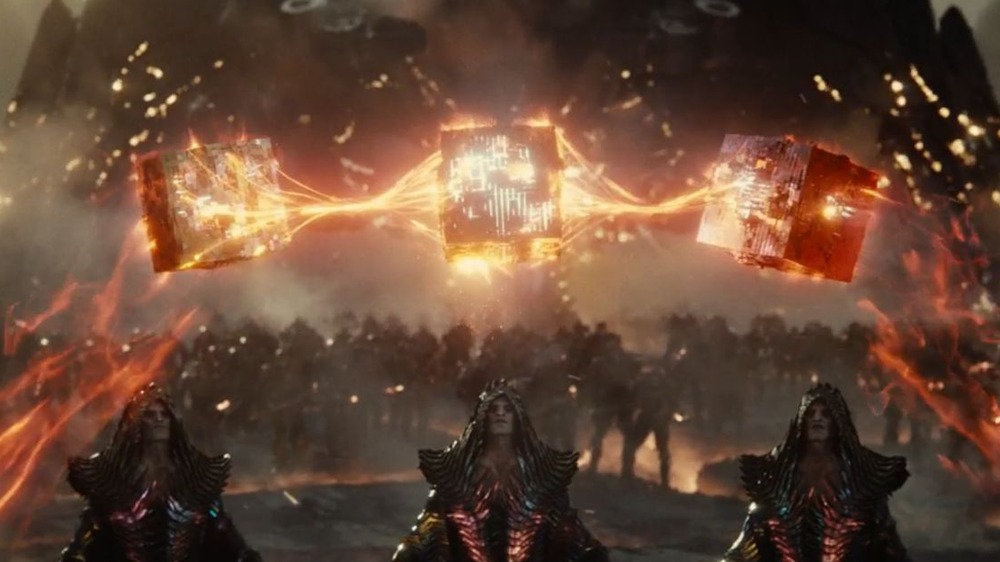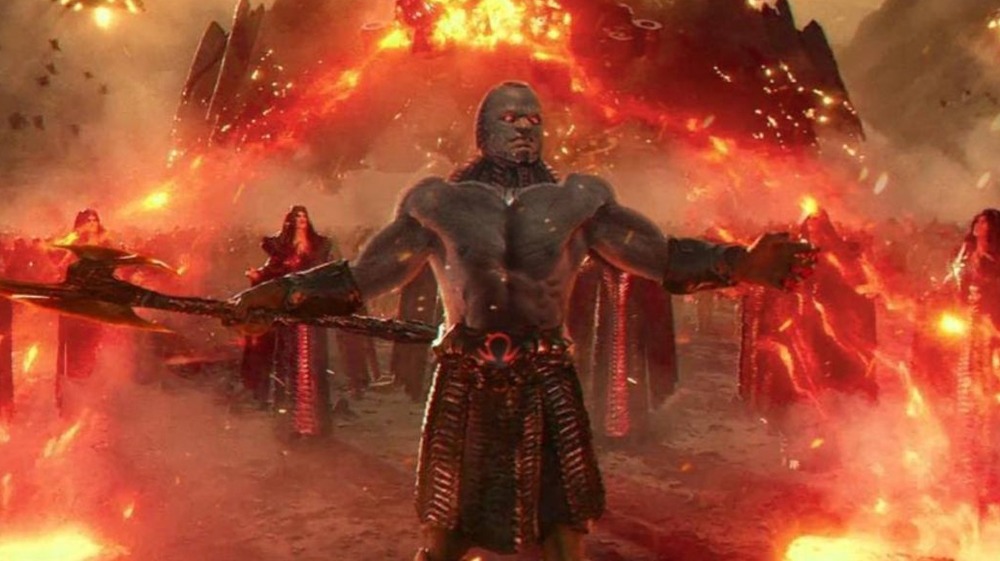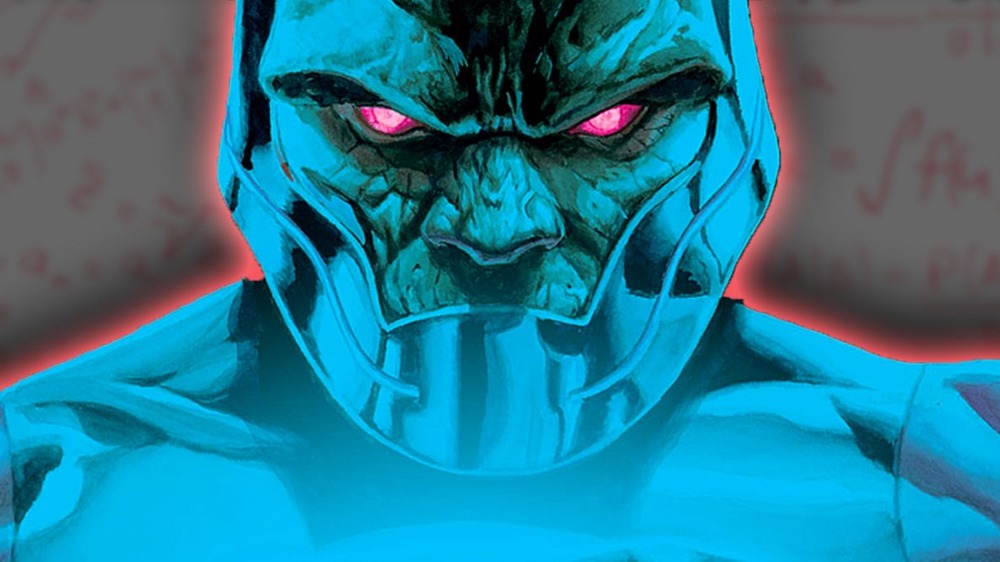Plot Holes In Zack Snyder's Justice League Everyone Ignored
It's been a little while since Zack Snyder's Justice League debuted on HBO Max, which means by now, we've had some highly necessary time to think about it. It's four hours of movie, after all, which left us with a lot to mull over.
The origin story of the film often referred to as "The Snyder Cut" makes it an utterly singular piece of media for reasons totally unrelated to anything that occurs onscreen. This is an instance of a major movie studio hiring a director for a project that had already languished in development for almost a decade; that director experiencing a family tragedy, and the studio swapping him out for another filmmaker partway through production; a collective "meh" arising from the public once a compromised version of the film hit theaters; and years later, the studio buckling to the demands of a social media fan campaign and releasing a new version edited and partially reshot by the original director.
It's a pretty wild situation! The critical consensus ranks director Zack Snyder's vision for Justice League ahead of the studio's attempt to Marvel-ize the franchise overseen by onetime Avengers mastermind Joss Whedon. But "better than bad" certainly isn't the same thing as "perfect," now is it?
We've noticed a few plot issues with Zack Snyder's Justice League, which we're going to go ahead and just start calling the Snyder Cut... massive spoilers ahead!
Has Batman never heard of the U.S. military?
In an extensive flashback to times predating recorded history — narrated by Wonder Woman (Gal Gadot) for the edification of Batman (Ben Affleck) — we see the first attempt Darkseid (Ray Porter) makes to conquer Earth. On a scale of bloody grandeur comparable to a battle scene from the Lord of the Rings trilogy, the combined forces of the Amazons, the Atlanteans, and mankind, plus a Green Lantern (R.I.P.) beat back Darkseid's legion of parademons and sundry other Apokolips-based beasties summoned to help his genocidal plans. Newfound knowledge of this secret history proves to Batman that his quest to unite the Justice League is more important than even he previously realized.
But wait... with all due respect to the warriors of Themyscira and Atlantis, and with no slight intended to their pagan gods, if Darkseid came up short against a bunch of ancient weapons, what kind of chance does he stand against modern military tech? According to what Wonder Woman tells us, the peoples and cultures of Earth don't need to unite this time; the United States Armed Forces can squash Darkseid and his flying monkeys without any outside assistance or much fuss.
This movie's basically been made twice, and both times, nobody involved ever said, "Hey, maybe we should add a line or two of dialogue to explain why Batman doesn't hear Wonder Woman's story and immediately call the President?"
A two-on-one fight defeats Darkseid?
Both versions of Justice League hinge on the idea that Darkseid and the forces of Apokolips are an imminent, existential, global threat — albeit one that only fully appears in the second edit. But during the multicultural, multi-species flashback slobber-knocker between Earth and Apokolips, Darkseid isn't felled by a team of godlike beings. Granted, he easily defeats a Green Lantern — but then he's rattled by Zeus' lightning, and Ares whacks him in the shoulder with an axe. And then Darkseid runs away.
Some lightning and an axe; that's all it takes.
The most evil, unstoppable, baddest of the bad guys to ever seek power and strive to eradicate all semblance of free will from the universe — no match for a well-placed sharp object. Apparently, that's Darkseid according to Zack Snyder.
The Zack Snyder's Justice League IMDb shows that the two attackers in that scene are Zeus (Sergi Constance) and Ares (David Thewlis), although the film could do a better job of clarifying their identities. In fact, based on his Viking-like regalia, you could mistake Ares for Thor — the Norse god of thunder, not the Marvel superhero with the same name, powers, appearance, personality, and familial backstory. But the ambiguous use of mythological figures feels irrelevant. The version of Darkseid we know from the comics would curb stomp all three of them without slightly dampening an armpit.
Why does Batman believe anything Lex Luthor tells him?
During the conclusion of Batman v Superman: Dawn of Justice, Batman drops by Lex Luthor's (Jesse Eisenberg) prison cell to threaten him with the Bat-branding iron that Batman thankfully forgets to use in either Justice League edit. Luthor says he feels like "civilization's on the wane; manners out the window," HINT HINT, and declares that the fall of Superman (Henry Cavill) means someone from the cosmos is coming to cause major trouble. Batman sets about assembling the Justice League to handle the inevitable crisis.
In the Snyder Cut, Alfred (Jeremy Irons) asks Batman why he's taking villain and clearly insane person Lex Luthor at his word, which does seem like a pretty weird thing to do.
"It has nothing to do with Lex Luthor," explains Batman. "It has to do with [Superman]. I made a promise to him on his grave. I spent a lot of time trying to divide us. I need to bring us together and make this right."
So... Batman's forming a team out of guilt, and the fact that Luthor is correct about the intergalactic invasion is just a coincidence?
Huh. Well, if Batman needs to amend his misdeeds against the citizens of Metropolis, wouldn't founding a charitable organization in Superman's name be a better plan? Wouldn't this movie make more sense if Batman, oh, let's say, runs into a parademon in the first scene, and that's how he finds out about the bad space monsters?
Why doesn't Barry Allen recognize Bruce Wayne?
Previous iterations of Bruce Wayne have been tabloid darlings and frequent subjects of the celebrity rumor mill. Perhaps it's presumptuous to assume the version of Bruce Wayne that inhabits the Snyderverse shares the same degree of fame; but in BvS — the movie in which Ben Affleck makes his debut as Batman — low-ranking Wayne Enterprise employees recognize him on sight, and diner party guests refer to him by name without any introduction. Even if he's not a household name on the level of, let's say, one of the Kardashian siblings, the general public in this universe appears familiar with Bruce Wayne.
So why does Barry Allen (Ezra Miller) — an obviously tech- and media-savvy guy — refer to Wayne as a "total stranger" upon their first encounter? Technically, that's an accurate statement, as they've never met. But if Mark Cuban or Elon Musk showed up in your living room, would you react to them the same way you would a typical unknown person inexplicably sitting in your second favorite chair?
For that matter, how could it be that Aquaman (Jason Momoa) and his friends act surprised when Bruce Wayne offers them tens of thousands of dollars to tell him where he can find Aquaman? He's Bruce Wayne, clearly! He has basically infinity money!
Could it be that while everyone in Gotham City and Metropolis knows who Bruce Wayne is, his fame only extends as far as the limits of those two cities?
Since The Anti-Life Equation is on Earth, why doesn't Darkseid immediately go get it himself?
Zack Snyder injected Darkseid into Justice League, which is a neat treat for fans of Jack Kirby's Fourth World. But whether or not the Snyder Cut provides the despotic ruler of Apokolips with enough substance to make him feel distinct from Thanos — a character Darkseid predates in the comics, but beat him to the big screen — remains another matter.
Since Snyder originally planned a Justice League trilogy, it once made sense to keep the Big Blue Cheese on the sidelines until the second movie. But once Steppenwolf (Ciarán Hinds) tells him his long sought but never found Anti-Life Equation is on Earth, why does Darkseid wait for a known disloyal screwup like Steppenwolf to handle the situation? At that point, why wouldn't Darkseid hop on a space ship, scoot over to Earth, find the Mother Boxes, combine them, and claim the Anti-Life Equation for himself? Why would he leave something so important in the hands of an incompetent middleman?
Snyder gave it a good try, but luckily for Fourth World fans, Ava DuVernay still has a New Gods film in the works. We might not have to wait too long for Darkseid's next cinematic incarnation.
Why do the heroes leave a Mother Box out in the open?
Zack Snyder's Justice League doesn't fix everything that's wrong with the theatrical cut of Justice League.
Let's consider the moments following Superman's resurrection. In the theatrical version, the heroes kind of forget about the third Mother Box during their fight with the Man of Steel, and Steppenwolf pounces on the opportunity to abscond with it to his weird dome headquarters. In the Snyder Cut, the Mother Box lands in the S.T.A.R. Labs parking lot... and then the heroes get preoccupied and forget about it.
The only difference is this time, Cyborg's scientist dad (Joe Morton) grabs the Mother Box before Steppenwolf chases him down, forcing Cyborg's scientist dad to sacrifice himself because this is a Zack Snyder DC movie, which means everybody's dad has to die or be victimized under tragic but quasi-noble circumstances, and everybody's mom has to die... except for Martha... and Hippolyta, Queen of the Marthas.
By this point in the movie, it's been repeatedly established that the three Mother Boxes are the most crucial MacGuffins since the Infinity Stones. If Steppenwolf combines all three, everybody dies. We get that fighting Superman can be distracting, but does it really seem plausible that all the active Justice Leaguers would forget to keep an eye on the literal most important thing in the history of life on Earth?
Why doesn't Martian Manhunter help with any of the fighting?
J'onn J'onzz, a.k.a. the Martian Manhunter, is one of the more prominent Justice Leaguers who usually appears in cross-media versions of the team, but is neither seen nor mentioned in the Justice League theatrical cut. It's nice that Snyder added him in, but it's debatable whether his pair of scenes have satisfactory reasons to exist.
The movie doesn't need J'onzz to deliver Lois Lane a stealth pep talk to nudge her out of post-BvS depression, nor it does it benefit from his tacked-on introduction to Bruce Wayne during the epilogue. But seeing as how J'onzz's extensive array of superpowers includes flight, shapeshifting, mind reading, and super strength, the Justice League itself sure could use his help during any of the several violent, life-or-death conflicts they find themselves in throughout the film.
Why does Martian Manhunter decline to intervene when, for one example, his telepathic gifts could restore the memories of the amnesiac, recently resurrected Superman and instantly save a whole bunch of people a whole bunch of grief? Who the heck knows.
Harry Lennix plays J'onzz in Zack Snyder's Justice League, as well as General Calvin Swanwick in Snyder's Man of Steel and BvS. It's unclear whether Lennix is playing two separate characters, J'onzz is mimicking Swanwick's appearance, or if Swanwick has secretly been the Martian Manhunter this entire time. If it's the latter, there are enough questions about this character to fill an entire list of its own.
If the Flash can run back in time, why does any of this matter?
Okay, so as Marvel knows all too well from Avengers: Endgame, putting time travel in your movie is practically an invitation for online snark-flingers to tease out the strands and present them as evidence that your plot doesn't make sense. And maybe it's unfair to let Snyder's purported plans for sequels inform our perspective on his cut, because even though Batman's Knightmares would theoretically come to fruition in those films, they're probably never getting made and their theoretical continuity doesn't exist.
But during the final showdown, the Mother Boxes form the Unity and everybody dies, until the Flash runs back in time stop the boxes and push the League back on the path to victory. So why does Batman still dream about the bleak future when the Flash is there, but doing anything other than dashing back to fix whatever caused the world to turn into less-fun Mad Max?
Does Batman not know about the Flash's time-travel chops? Did Flash decide to not tell his cohorts that actually they failed and Steppenwolf won — and the world only got saved because of the Flash and his awesome powers? Does the Flash, at any point in either Justice League edit, seem like the kind of guy who would keep something that makes him look that cool a secret?
Why did the humans bury their Mother Box three feet underground?
In the centuries that follow the 300-esque brawl-for-it-all Wonder Woman tells us about, the three Mother Boxes on Earth are individually overseen by the Amazons, the Atlanteans, and humankind. Early on in both versions of Justice League, Steppenwolf must cut down the dozens of Amazon warriors who watch over Themyscira's Mother Box at all times before he claims the prize. Atlantis has a similar Mother Box defense scheme, albeit with fewer guards. Meanwhile, the flashback shows us a bunch of Arthurian-type medieval humans dropping their Mother Box three feet underground... and, apparently, just kinda dawdling off and leaving their Mother Box — a potential doomsday device — for S.T.A.R. Labs to discover centuries later.
Did ancient humans assume Darkseid had never heard of shovels?
Did it not occur to them that it might be a good call to set up some sort of secret order to manage the location and ongoing concealment of mankind's Mother Box? Obviously, nobody wants the existence of Mother Boxes or the nightmare hellscape planet they come from to become common knowledge among panic-prone humanity, so it makes sense to keep all matters related to Apokolips a secret. But if Atlantis and Themyscira both have their Mother Boxes guarded in actual fortresses, shouldn't humanity's Mother Box be locked down in a hidden bunker three miles under the White House or Buckingham Palace, or, y'know, anywhere more secure than high school student Victor Stone's bedroom closet?
Why doesn't Darkseid use his spaceship and its giant laser cannons against ancient Earth?
We know we've been harping on the humongous flashback fight a lot, but since it pretty much sets up the core conflict that drives the rest of Zack Snyder's Justice League, we can't give it any free passes.
Darkseid and his army of parademons arrive on Earth in cloud-sized spaceships, right? We assume these interplanetary transport vehicles all include weapons systems, seeing as how they originate from Apokolips — a violence- and-oppression-obsessed civilization. We know spaceships from Apokolips all have laser canons installed on them, because little rubber baby pacifiers from Apokolips have laser canons installed in them.
So why doesn't Darkseid simply flip the "on" switch on his ship's firepower systems and rain death beams down on all the humans, Atlanteans, Amazons, plus Zeus, Ares, Thor, Baphomet, Rao, Xenu, and whoever else is down on the ground attempting to fend off his conquest? Wouldn't that be easier and much more fun than jumping down there to fight off an entire planet, plus that planet's mythological figures, with his bare hands?
Heck yeah! But if Darkseid does that, Darkseid wins, takes over Earth, and Zack Snyder's Justice League literally ends before it can begin.
How did Darkseid lose track of the Anti-Life Equation in the first place?
For the purposes of Zack Snyder's Justice League, the Anti-Life Equation is an abstract concept. Steppenwolf says he sees Anti-Life, but from our perspective, it looks like he just senses it; the film never shows Anti-Life to the audience as if it's a physical, tangible object. So maybe there's some room to be flexible in terms of plausibility with regards to Anti-Life, but there's a limit.
Speaking to Desaad, Steppenwolf recites the legend of Darkseid searching for Anti-Life — the so-called "key to controlling all life and will across the multiverse." Steppenwolf says Darkseid found Anti-Life on a "primitive planet," but something happened, and Desaad interrupts Steppenwolf before he can finish the story.
So hold on...
If Darkseid found Anti-Life — the means by which he can conquer all things, and therefore the most important thing in his life — why has he been doing anything other than looking for it? Why would he ever just forget about it and go about other business? Also, was Anti-Life on Earth the first time Darkseid came here? If so, why would he just surrender and leave basically forever? Even if he lost the first battle, wouldn't he regroup and come back for round two as soon as possible?
